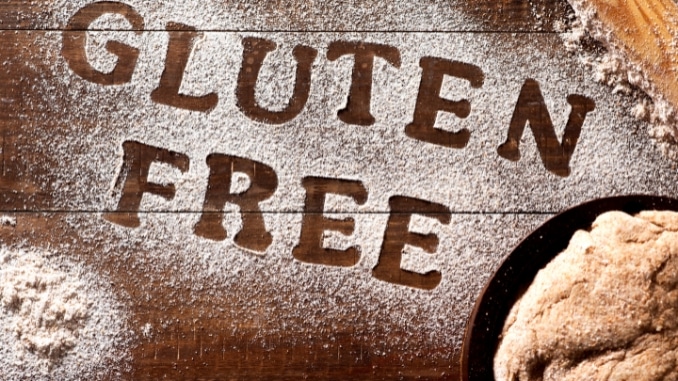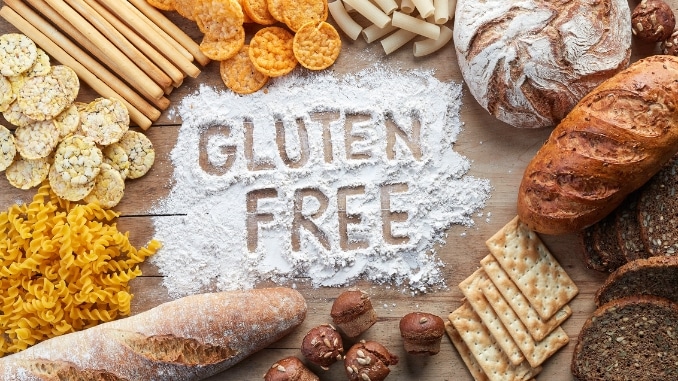Recovering from an injury isn’t just about exercises and therapy—what you eat can play a major role too. In this expert guest post, Dr. Peter Osborne explains how gluten may interfere with your body’s natural healing process.
If you’re dealing with chronic pain, inflammation, or slow recovery, this insight into gluten’s potential impact on injury rehabilitation could help you make more informed choices that support a faster, healthier recovery.
Introduction to Gluten
- Gluten is the main protein in wheat; it’s also found in rye and barley. Oats may contain gluten [1] due to cross-contamination during processing.
- It’s made of two main proteins: gliadin and glutenin.
- Similar proteins are called secalin [2] (rye), hordein (barley), and avenins (oats).
- It is a protein found in wheat, barley, and rye, acting as a natural binder and providing elasticity in dough.
- You’ll find it in many everyday food products, especially those made from wheat, such as bread, pasta, cereal, baked goods, and pizza. It is also added to processed foods, such as ice cream and sauces, as well as some medications, to improve texture and stability.
The Role of Gluten in Injury Recovery
Gluten can trigger inflammation in people with celiac disease or non-celiac gluten sensitivity.
Celiac disease (CD) is an autoimmune disorder, not a food intolerance, and more people are being diagnosed with it. The main treatment for CD and other gluten-related issues, like gluten sensitivity or wheat allergies, is a gluten-free diet (GFD).
For many, avoiding gluten can improve health, especially during injury recovery. For some individuals, it may interfere with recovery by triggering inflammatory cytokines in susceptible people, although evidence on this is limited.
Chronic inflammation may:
- Delay tissue repair
- Prolong joint and muscle pain
- Interfere with immune system response
Gut damage from gluten can impair nutrient absorption – especially:
- Vitamin D (bone and immune health)
- Zinc (Wound healing)
- Magnesium (muscle repair)
- Protein and amino acids (tissue rebuilding)
Poor nutrient absorption slows:
- Recovery from strains, sprains, surgeries
- Collagen production and connective tissue repair
- Overall energy and immune resilience
Eliminating gluten (even short term may)
- Reduce systemic inflammation
- Improve digestion and absorption
- Accelerate injury healing in sensitive individuals
Health Risks
- Digestive System: For some people, it can cause bloating, gas, and stomach discomfort. This occurs because their digestive system struggles to break down gluten, resulting in symptoms such as bloating or cramping.
- Inflammation: It may trigger inflammation in certain individuals, which can cause pain and discomfort in joints, as well as headaches. This inflammation can develop into a chronic issue, impacting overall well-being.
- Immune System: In people with celiac disease, it sparks an autoimmune response that damages the lining of the small intestine. This prevents the body from properly absorbing nutrients and can lead to a range of health problems.
- Mental Health: Recent studies suggest that it may play a role in mental health issues, such as anxiety, depression, and brain fog. For some individuals, it can affect mood and cognitive function, leading to feelings of mental fatigue or confusion.
Celiac Disease and Autoimmune Disorders
Gluten, a protein found in grains such as wheat, barley, and rye, is harmful to individuals with celiac disease or non-celiac gluten sensitivity. For many, avoiding it can improve health, especially during the recovery from injury. For some individuals, it may interfere with recovery by triggering inflammatory cytokines in susceptible people, although evidence on this is limited.
- Celiac disease is an autoimmune disorder that causes inflammation in the small intestine and can lead to intestinal damage.
- People with celiac disease must follow a strict GFD to prevent symptoms and health complications.
- Untreated celiac disease can lead to malnutrition, iron deficiency, and other health concerns.
- Celiac disease is often associated with other autoimmune disorders, such as rheumatoid arthritis and dermatitis herpetiformis.
- Celiac Disease (CD) [3] is an autoimmune disorder, not a food intolerance, and more people are being diagnosed with it. The main treatment for CD and other gluten-related issues, like gluten sensitivity or wheat allergies, is a GFD.
Benefits of Gluten-Free Options

- Improved Digestion: Reduces bloating, gas, and discomfort for those with gluten sensitivity or celiac disease.
- Healthier Gut: Can improve gut health by avoiding gluten-related damage in the small intestine.
- Better Nutrient Absorption: Helps individuals with celiac disease absorb nutrients more effectively by preventing intestinal damage.
- Reduced Inflammation: May help reduce inflammation in the body, particularly for individuals with autoimmune disorders such as rheumatoid arthritis.
- Increased Energy: Some individuals report feeling more energetic and less fatigued after eliminating it.
- Support for Weight Management: May encourage healthier eating habits, such as consuming more whole foods, which can help in maintaining a healthy weight.
Health Risks of Gluten Consumption
- Consuming it can trigger an immune reaction in people with celiac disease, leading to digestive symptoms and intestinal damage.
- Non-celiac gluten sensitivity can cause gastrointestinal symptoms, such as abdominal pain, bloating, and diarrhea.
- For some individuals, eating gluten-containing foods may exacerbate symptoms of conditions like irritable bowel syndrome, though this is not universally true.
- GFD can help alleviate symptoms and improve digestive health in individuals with gluten intolerance.
Gluten-Free Foods and Nutrition

- Fruits: Apples, bananas, berries, oranges
- Vegetables: Spinach, carrots, broccoli, potatoes
- Meats: Chicken, beef, pork, turkey
- Fish and Seafood: Salmon, shrimp, tuna, cod
- Grains: Rice, quinoa, corn, millet
- Legumes: Lentils, chickpeas, beans
- Dairy: Milk, cheese, yogurt (check for added ingredients)
- Nuts and Seeds: Almonds, walnuts, chia seeds, sunflower seeds
- Gluten-Free Flours: Almond flour, coconut flour, rice flour
- Gluten-Free Grains: Buckwheat, sorghum, teff, amaranth
- Gluten-Free Pasta: Made from rice, corn, or quinoa
- Gluten-Free Bread: Made from gluten-free flour mixes.
Who Should Avoid It?

- Celiac Disease: Autoimmune reaction to gluten
- Wheat Allergy: Allergic reaction to wheat
- Non-Celiac Gluten Sensitivity: Digestive discomfort
- Autoimmune Disorders: May benefit from gluten-free
- Digestive Issues: Bloating, pain, or diarrhea
- Pregnant People: Consult a healthcare provider for advice, as there is no general recommendation for avoiding it during pregnancy without a medical reason.
According to Dr. Benjamin Lebwohl, a gastroenterologist at Columbia University, people with gluten sensitivity might experience symptoms such as indigestion, bloating, and irregular bowel habits after eating gluten.
Alternatives
- Coconut flour
- Tapioca flour
- Chickpea flour
- Sorghum flour
- Millet
- Buckwheat
- Amaranth
- Teff
- Potato starch
- Arrowroot flour
To expedite recovery from injuries, Dr. Osborne suggests eliminating gluten from the diet. This dietary change can help reduce inflammation and support the body’s natural healing mechanisms. It’s important to consult with a healthcare professional before making significant dietary changes.
For a more in-depth understanding, you can listen to the full interview here.
Conclusion
Gluten can be harmful to people with celiac disease, wheat allergy, or non-celiac gluten sensitivity. For these individuals, a gluten-free diet (GFD) is a safe and healthy alternative to foods containing gluten. It’s important to understand the potential health risks associated with gluten for certain individuals and make informed dietary choices based on individual health needs.
A healthcare professional can help create a personalized plan for those with gluten intolerance. While a GFD can benefit some, it may not be necessary for everyone. It’s essential to carefully consider the pros and cons of going gluten-free and consult with a doctor before making any major dietary changes. This way, people can make choices that support their health and well-being.
Want to speed up recovery and reduce inflammation naturally?
Explore our injury recovery programs or contact our team to get personalized guidance for healing smarter.
Frequently Asked Questions
How is gluten harmful to the body?
It can harm people with celiac disease or gluten sensitivity. It can cause digestive issues, inflammation, and damage to the intestines.
Why should we avoid gluten?
People with celiac disease should avoid it to prevent symptoms like bloating, pain, and long-term health issues like gut damage.
What are the benefits of not eating gluten?
For those with sensitivity, cutting it out can reduce symptoms like bloating, discomfort, and fatigue. It can help improve digestion and energy levels.
What does cutting out gluten do to your body?
Cutting it out can help people feel better by reducing digestive issues, inflammation, and symptoms like fatigue, especially if they have intolerance or celiac disease.


